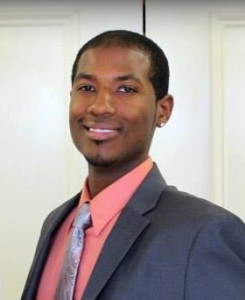 Terence Randall is a native of Memphis, TN and previously obtained his bachelor’s degree from UT’s Electrical Engineering program. After four years, he has earned a doctoral degree in Electrical Engineering.
Terence Randall is a native of Memphis, TN and previously obtained his bachelor’s degree from UT’s Electrical Engineering program. After four years, he has earned a doctoral degree in Electrical Engineering.
His dissertation titled ” A Low-power, reconfigurable, pipelined ADC with automatic adaptation for bio-impedance monitoring applications” examines how integrated circuitry can better adapt to different frequencies in bio-signaling. Specifically, he designed a circuit that can convert signals from the body into a digital format faster than what has been previously designed. Terence’s research has significant biomedical implications because medical professionals use bio-signals to examine a wide array of diseases such as diabetes & cancer.
Terence notes, “Clearly the PEER fellowship helped me complete my degree and every PEER student can say that. I got to present my research at conferences and got exposed to different research in my field. However, the community in PEER is just as important. I interact with people in my cohort, mentor people who are just starting out, and I even have someone I consider my big brother. All of that interaction helped me grow as a person and kept me on track.”
Terence is in the midst of applying for positions in the electrical engineering industry, specifically to companies that will allow him to design circuitry and that do significant work in integrated circuitry. He explains, “I’ll be using some of the skills learned in the PEER discourse meetings when I enter the workforce. For example, I still have my notes on salary negotiation, which will come in handy when I obtain employment and the awareness I gained from the lesson on how to communicate to a lay audience will stick with me forever.”